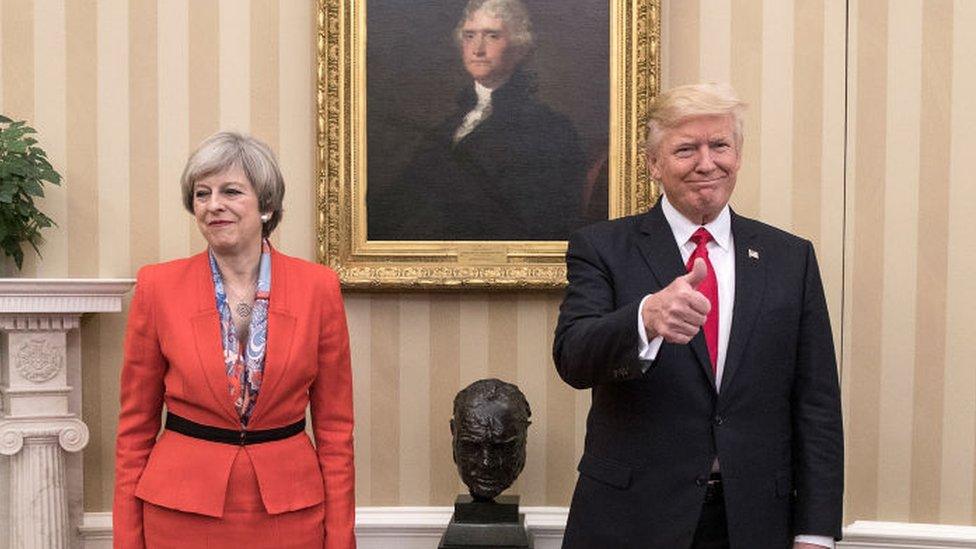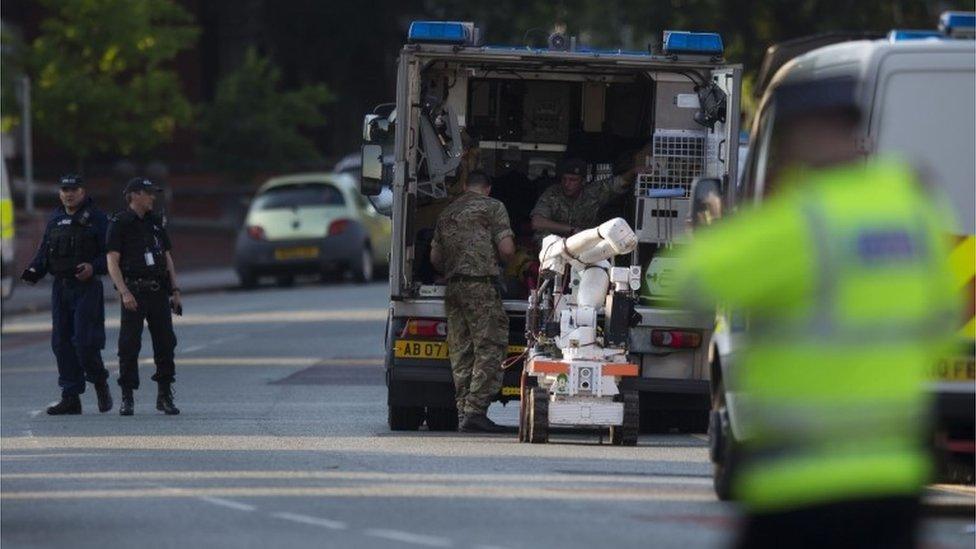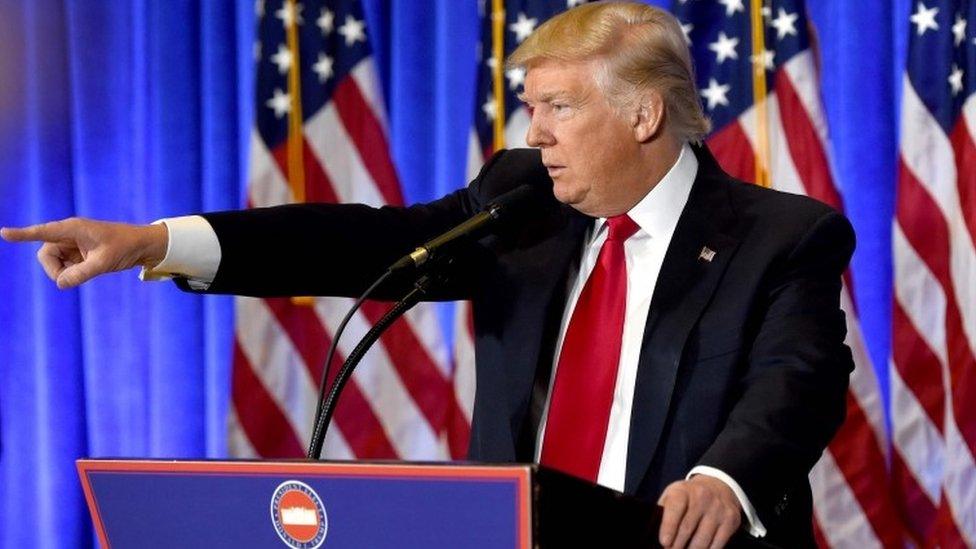Will intelligence leaks sink US-UK relationship?
- Published

On Wednesday morning, British Home Secretary Amber Rudd issued a stern rebuke to the US government for leaking the name of the suspect in the Manchester bombing to American news outlets before UK authorities were prepared to make it public.
She might as well have been shaking her fist at a cloud, for all the good it did.
By Wednesday evening, not only had the US media divulged more details of the investigation - information on Salman Abedi's family and his international travels - the New York Times printed close-up photographs of fragments of the Manchester bomb and the apparent tattered remains of the backpack that held it.
British officials have gone from irritated to furious, and Manchester police began withholding further details of the attack from US intelligence out of concern that the leaks are tipping off suspects and impeding its investigation.
The porous nature of the US government - its inability to protect sensitive information - may come as a shock to the international community, but in the US it's just another day at the proverbial office.
Lewis Lukens says he doesn't know where the leaks are coming from
During the 2016 campaign, the FBI leaked a crescendo of damaging details about its investigation into Democratic candidate Hillary Clinton in the days leading up to the presidential election. Since then, the intelligence community has been a sieve of unflattering information about President Donald Trump, including sharing embarrassing accounts of his interaction with foreign leaders and the communications of his advisers.
Although it was overshadowed by the nature of the revelations, the fact that the contents of intercepted phone conversations between Trump adviser Michael Flynn and a Russian ambassador made the front page of the New York Times was an extraordinary violation of surveillance protocols.
Then there are the leaks that have originated within the Trump administration itself, as rival factions share pointed details about the internal machinations of the White House in a scramble to gain favour with the president. And while not technically a leak, the (leaked) news that Mr Trump himself revealed sensitive information to a Russian delegation in the Oval Office reportedly given to the US by Israeli intelligence has contributed to the growing sense that the US government is dysfunctional, at best.
Until recently it was a condition Americans had largely kept to themselves. Now US allies are part of the game.


All this comes as the Trump administration is pressing for increased co-operation between the US and European allies, including the UK, to counter extremist violence and combat the so-called Islamic State. That includes a recently announced Nato plan to create a new intelligence-sharing division and an anti-terrorism "fusion cell".
For the moment all the parties who are talking - on and off the record - say that this episode won't affect US efforts to foster greater international collaboration or threaten the US-UK "special relationship".
Mr Trump, in a statement released to the media, called the leaks "deeply troubling" and re-emphasised the strength of the US-UK alliance.
"There is no relationship we cherish more than the special relationship between the United States and the United Kingdom," he said.

Follow Anthony Zurcher, external on Twitter.

The thing about leaks is they're usually put out for a reason. The ongoing feud between Mr Trump and the intelligence community helps explain why US media have had a string of explosive stories about Mr Trump and the Russian investigation over the past few weeks. It's easy to see who profits and suffers from whatever bits of White House palace intrigue splash across the front pages on a near daily basis.
The Manchester leaks, however, are a bit more difficult to peg. Who, exactly, benefits? Some of the leaks have been attributed to "intelligence sources" others to "police officials", which doesn't narrow things down much.
The leaks are certainly an embarrassment for the Trump administration, making his team appear unable to run a tight ship at a time when he's taking his first turn on the world stage.
On the other hand, this will bolster the president's efforts to paint the leaks that have bedevilled his White House as a threat to national security, hindering the US ability to fight militant extremists. Mr Trump has complained that the intelligence community hasn't taken the onslaught of leaks seriously over the past few months. Perhaps it will now.
"These leaks have been going on for a long time, and my administration will get to the bottom of this," Mr Trump said in his statement. "I am asking the Department of Justice and other relevant agencies to launch a complete review of this matter, and if appropriate, the culprit should be prosecuted to the fullest extent of the law."
Donald Trump has been critical of other damaging leaks
There may be someone in the US government who thinks these revelations could pressure the UK to take more aggressive steps of its own to address what Mr Trump in the past has termed "radical Islamic terrorism".
Then there's the possibility that the leaks are merely one person's attempt to gain favour with a reporter or burnish his or her reputation as a knowledgeable insider.
If there's one lesson to be learned from the past year, it's there is often no need to look for complex explanations when simple individual pride or incompetence fits the bill.
Whatever the explanation, officials in both the UK and the US say the Manchester leaks are going to stop.
UK officials said on Thursday evening they had resumed sharing information with the US after receiving "fresh assurances" from across the Atlantic.
The question is what happens the next time. And the time after that.
"At the moment we have a US administration and US intelligence agencies all leaking like sieves, so I'm afraid this is the reason why this has happened," says former UK ambassador to the US Christopher Meyer. "Will it destroy our close co-operation with the Americans? Of course not, because if it didn't exist it would have to be invented. But this is a serious knock. It is a serious dent."
Intelligence sharing, British Prime Minister Theresa May said, is built on trust. Trust typically doesn't vanish in an instant, it erodes slowly, imperceptibly. And then it's gone.
- Published26 May 2017

- Published11 January 2017

- Published12 June 2017

- Published12 June 2017

- Published30 May 2017